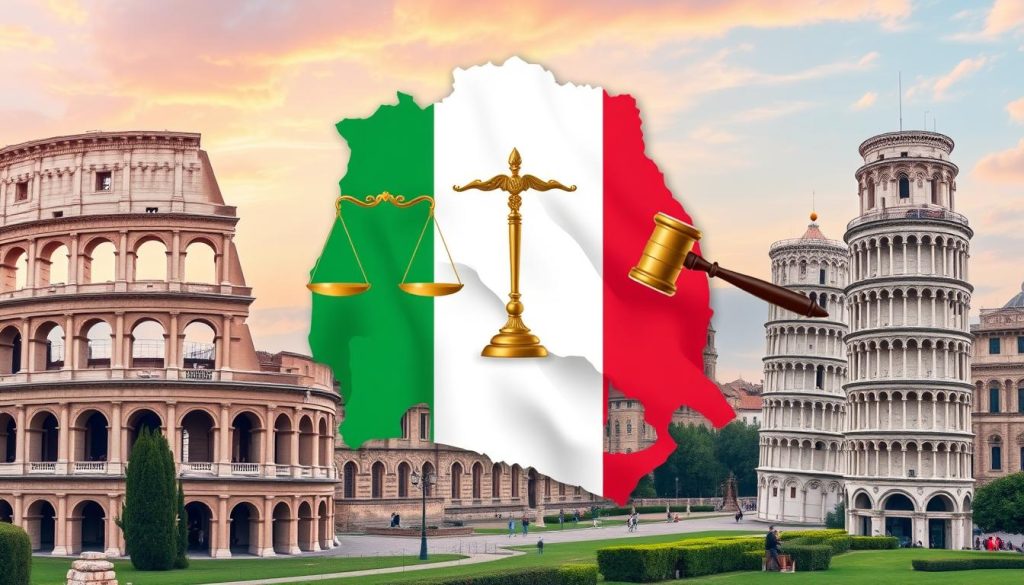Starting a business in Italy is both exciting and challenging for foreign entrepreneurs. The Italian market is full of culture and diversity, perfect for new ideas. But, it’s key to know the local customs and rules to succeed.
This guide will help you understand the Italian business world. It’s designed to give foreign entrepreneurs the knowledge they need to do well. With more foreign investment, Italy is full of chances for those who are ready to fit in.
Key Takeaways
- Potential for lucrative opportunities in the Italian market.
- Importance of understanding local customs and regulations.
- Significant role of foreign investment in Italy’s economy.
- Adapting business strategies to align with local culture enhances success.
- This guide offers comprehensive insights for foreign entrepreneurs.
Understanding the Italian Business Landscape

The Italian business scene offers many chances for foreign entrepreneurs. Italy’s economy is growing in areas like tech, fashion, and food. These sectors are key in shaping the market trends in Italy.
People in Italy often prefer high-quality items made with care. This focus on craftsmanship is important.
Foreign investment in Italy is strong, especially in places like Lombardy and Emilia-Romagna. These areas get a lot of international money because of their good infrastructure and skilled workers. Knowing the rules is key for businesses to run smoothly.
Looking at economic numbers shows different growth rates in Italian regions. Tourism plays a big role, especially in places like Tuscany and the Amalfi Coast. It helps small businesses grow and boosts local innovation.
Knowing these details is vital for entrepreneurs. To succeed in Italy, you need to understand the business scene well. This knowledge can greatly help newcomers.
Legal Requirements for Foreign Entrepreneurs

Starting a business in Italy as a foreign entrepreneur requires knowing the legal rules. It’s important to understand Italy’s business laws well. This knowledge helps you navigate the legal system successfully.
Foreign entrepreneurs must meet several key requirements before starting. These include:
- Getting a residency permit if you plan to live in Italy.
- Registering with the local chamber of commerce for business licenses.
- Knowing about Italian taxes, including VAT registration.
- Following the commercial codes that govern business practices.
Legal compliance in Italy goes beyond just registering your business. In some sectors, you might need a fiscal representative. This person or company helps with tax rules and is the main contact for tax issues.
To make sure you’re following the law, it’s wise to talk to legal and tax experts. They know the details of Italy’s business laws well.
How to Start a Small Business in Italy as a Foreigner

Starting a small business in Italy is complex. You need to know the steps and paperwork. Foreigners must follow local rules and handle Italian documents well.
Navigating Italian Bureaucracy
The Italian bureaucracy can be tough. First, get a tax ID, the Codice Fiscale. It’s needed for many things, like opening a bank account. Then, register with the Chamber of Commerce to get your business officially recognized.
Required Documentation
You need the right documents for your business. Here are some important ones:
- Business plan outlining objectives and strategies
- Identification papers, such as a passport or national ID
- Proof of capital demonstrating financial readiness
Be ready for delays and watch out for common mistakes. Being prepared helps you smoothly start your business in Italy.
Choosing the Right Business Structure

Starting a business in Italy means picking the right business type. There are many options, each with its own benefits and drawbacks. Let’s look at the main types in Italy and what they offer.
Types of Business Entities in Italy
- Sole Proprietorship (Impresa Individuale): Perfect for small businesses run by one person.
- Partnership (Società di Persone): For businesses with two or more owners, it can be general or limited.
- Limited Liability Company (Società a Responsabilità Limitata – SRL): A mix of flexibility and protection for owners, great for growing businesses.
- Joint Stock Company (Società per Azioni – SPA): Best for big companies, shares capital and limits liability for shareholders.
Advantages and Disadvantages of Each Structure
Each business type has its own benefits and challenges. Here’s what to consider for each:
- Sole Proprietorship:
- Advantages: Easy to start, full control, low costs.
- Disadvantages: Unlimited liability, hard to get funding.
- Partnership:
- Advantages: Shared skills and resources, flexible.
- Disadvantages: Shared risk, can lead to disagreements.
- Limited Liability Company (SRL):
- Advantages: Limited liability, tax perks.
- Disadvantages: More complex setup, ongoing rules to follow.
- Joint Stock Company (SPA):
- Advantages: Can raise capital with shares, limited liability.
- Disadvantages: Lots of rules, more costly to keep up.
Registering Your Business in Italy

Starting a business in Italy means following a few key steps. It’s important to know the process well, whether you’re new or have experience. First, decide what kind of business you want to start. This choice affects the steps you need to take.
Getting a codice fiscale, or tax ID, is the first step. You get this from the Agenzia delle Entrate. It’s vital for taxes and must be done before you can go further. Next, you need to register with the local Chamber of Commerce. You’ll need to fill out forms and provide documents to prove your business is real.
- Fill out the application form for registration.
- Provide proof of identity and residence.
- Submit any required business plans or project documentation.
Also, you might need to register for VAT if your sales are high enough. Doing these steps now helps avoid problems later and sets a strong base for your business.
After you’ve finished all the registrations, make sure you get the right certificates. These prove you follow Italian laws. They’re important for working with other businesses and the government.
Tax Obligations for Foreign Entrepreneurs

Foreign entrepreneurs need to understand Italy’s tax rules when starting a business. Italy has different taxes for businesses, including corporate tax and VAT. These taxes depend on what your business does. Following these rules is key to your business’s success.
Corporate tax is based on a company’s income. You must register for tax when you start. VAT is a tax on goods and services. Businesses must collect and pay this tax to the government. Local taxes also apply, based on where your business is.
Startups can find tax breaks to help them grow. These can be a big help when you’re just starting. It’s important to know when to register for taxes and follow all rules. Not doing so can lead to fines or legal trouble, harming your business.
Finding a Suitable Location for Your Business

Choosing the right business location in Italy is key to success. You must weigh the pros and cons of urban versus rural settings. Consider market access, customer demographics, and logistical benefits in each area.
Urban vs Rural Considerations
Urban areas buzz with markets, foot traffic, and diverse customers. Yet, competition is high in big cities. Rural spots might be cheaper and foster community ties, but reaching customers and managing supply chains can be tough.
Knowing the urban rural business trends in your field helps make a better choice.
Market Research and Demographics
Doing deep market research in Italy is crucial. Look into local demographics to understand consumer habits and tastes. Use government stats, industry reports, and surveys to guide your research.
Tools for analysis can help pinpoint the perfect spot for your business. This spot should match your goals and target audience.
Setting Up Your Business Bank Account

Starting a business needs a solid financial base. Choosing the right bank and account is key. In Italy, you have many options, like current accounts and special business accounts for new companies.
To open a business account in Italy, you need certain documents. These include:
- A valid identification document
- Business registration papers
- Tax identification number
- Proof of address
Having a good banking relationship helps manage money better. It also makes it easier to get payments from clients. The bank you choose can offer more services, like credit or merchant accounts. These are important for growing your business in Italy.
Understanding Employment Laws in Italy

Employment law in Italy is key for both foreign entrepreneurs and local businesses. Knowing workers’ rights, contract rules, and how to fire staff is vital. This part explains the main points of hiring in Italy, like the legal rules for work contracts and the role of labour unions.
Following these laws helps create a fair work place and keeps your business safe from legal problems. It’s also important to know about Italian immigration rules, especially for hiring people from outside the EU.
Hiring Local Employees
When you hire local staff, you must follow certain legal steps. The process includes:
- Creating a clear job contract that lists duties, pay, and work conditions.
- Knowing the National Collective Labour Agreement (CCNL) for your industry. It sets the minimum pay and work standards.
- Building good relationships with labour unions. They help protect workers’ rights.
Following employment law in Italy not only keeps you legal but also makes you a respected employer.
Complying with Immigration Laws
Hiring staff in Italy also means dealing with complex immigration rules, especially for non-EU workers. Important points are:
- Getting the right work permits for employees from non-EU countries.
- Knowing the different visas for different jobs and qualifications.
- Making sure all paperwork is correct to avoid fines.
Knowing these rules helps make hiring easier and builds a diverse team that can help your business grow.
Building a Business Network in Italy

Building a strong business network is key to success in Italy’s fast-paced market. Networking here can lead to valuable resources, insights, and partnerships. These can help any entrepreneur grow. Foreigners can gain a lot by joining local business groups and chambers of commerce. This boosts their visibility and credibility in Italy.
Leveraging Local Business Associations
Business associations in Italy are great for entrepreneurs to connect and grow. By joining business associations Italy, you get access to seminars, workshops, and events. Here are some key associations and tips for networking:
- Join groups like the Italian Chamber of Commerce for sector-specific connections.
- Go to networking events by local forums to meet people from different fields.
- Get involved with Italian entrepreneur networks for startup or industry-specific support.
- Use online platforms to find partners, investors, and mentors.
Going to these events helps you make important connections. It also lets you learn about local business and culture. Being active in networking in Italy can open up new partnership and growth opportunities.
Marketing Your Small Business in Italy

Marketing in Italy needs a deep understanding of local culture and what people like. Ads in Italy must fit with the unique ways Italians shop. Social media, local papers, and radio are great ways to reach out.
Key parts of good marketing include:
- Knowing how culture affects what people buy.
- Working with local influencers to make your brand more believable.
- Joining in local events to connect with possible customers.
Digital marketing is key to reaching people in Italy. Sites like Instagram and Facebook are big hits with locals. Using these can make ads that really speak to people.
Studies show that foreign businesses do well by getting marketing right. Brands that match what Italians want not only do well but also keep customers coming back. Really getting to know the local scene is crucial for success in Italy.
Funding Options for Startups in Italy

Looking for funding is key for entrepreneurs starting a business in Italy. There are many financial options, from government grants to private investments. Knowing these can help you get the money you need for your business.
Grants and Subsidies for Foreigners
Italy has many grants for entrepreneurs Italy, especially for foreign businesses. These grants come from the government and the European Union. They support innovation and economic growth in areas like technology and culture.
It’s important to know who can apply and how to apply. This way, you can make the most of these opportunities.
- Regional Development Grants
- Start-Up Incentive Programmes
- EU-Funded Initiatives
Private Investment Opportunities
Private investment in Italy is also crucial for startups. Many angel investors and venture capital funds look for new businesses to support. A strong business plan and good networking can draw in investors.
- Angel Investors
- Venture Capital Funds
- Seed Funding Networks
Challenges Faced by Foreign Entrepreneurs
Starting a business in Italy is tough for foreign entrepreneurs. Language barriers are a big problem. Without Italian, it’s hard to talk to suppliers, customers, and officials. This can slow down your business.
To get around this, getting help with the language or hiring people who speak both is smart. It makes communication easier.
Italy’s bureaucracy is also a big challenge. There are lots of rules, permits, and taxes to follow. Foreign entrepreneurs need to be patient and careful.
Having local advisors, like accountants or lawyers, is very helpful. They can guide you through the system and make sure you follow the rules.
Cultural differences are also important in Italy. Knowing local customs and how people shop is key. It helps in making your marketing better and building good customer relationships.
Being open to local ways and working with partners can help. By understanding Italy’s unique culture, entrepreneurs can succeed despite the challenges.
















